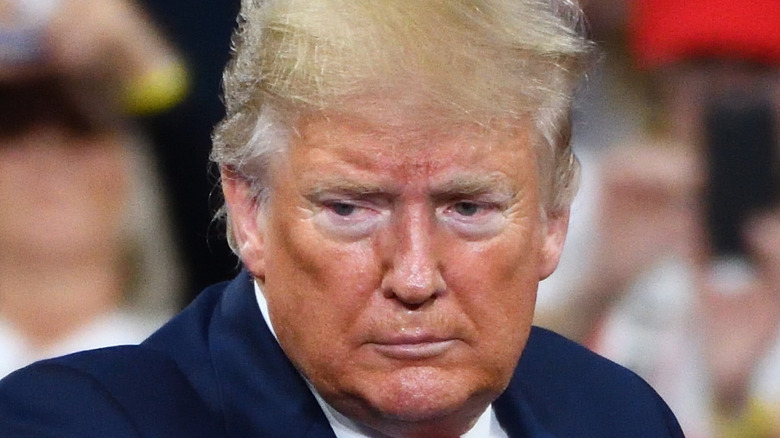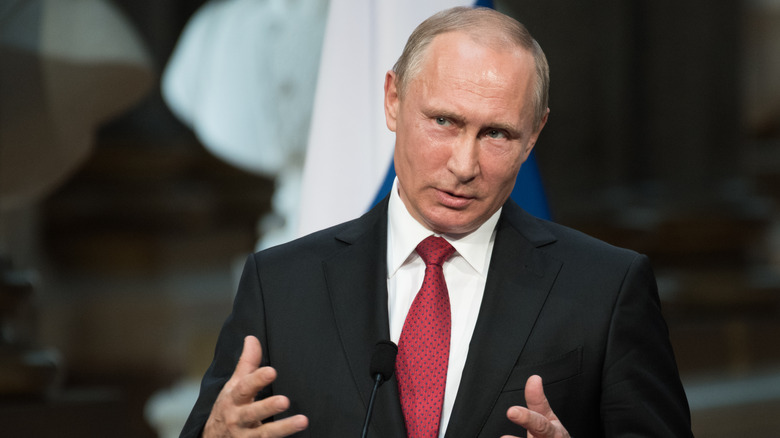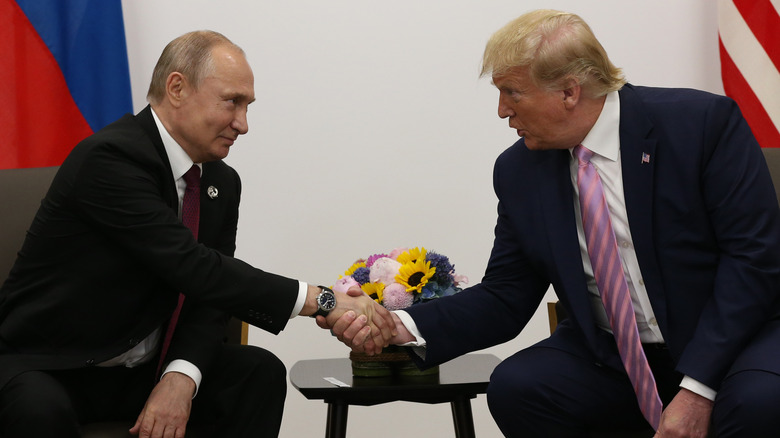Donald Trump And Vladimir Putin's Relationship Explained
One is loud, the other is quiet. One is the funny man, the other is the straight man. One loves wearing red and inciting insurrections while calling neo-Nazis "very fine people" (transcript on PolitiFact). The other loves going shirtless horseback riding while outlawing "gay propaganda" (described on Human Rights Watch). Toss them in a geopolitical blender and you've got a tragicomical farce that would make good, cautionary fiction if only it wasn't real.
The root of Donald Trump and Vladimir Putin's "relationship" goes back to Russia's tampering with the U.S. 2016 presidential election. This gets very complicated very fast, so let's recap: In 2017, former FBI head Robert Mueller (2001-2013) was selected by Rod Rosenstein, deputy attorney general, to lead a "special counsel" to investigate the truth of Russian interference in the 2016 U.S. president campaign, particularly the hacking of Hilary Clinton's campaign servers in an attempt to conduct a smear campaign on the then-presidential candidate.
As the BBC outlines, the 2019, 488-page report concluded that yes, Russian did exfiltrate about 370 combined gigs of data from Clinton's and the DNC's servers (explained in detail on Tech Crunch), but no, Trump didn't conspire to make this happen. He did, however, attempt to obstruct Mueller's investigation 10 different times. For the intrepid, ABC has an achingly complex chronicle of these events, and The New York Times has a dedicated article-by-article timeline.
But still, Trump always seemed buddy-buddy with Putin. Is there something else going on?
Trump was declared innocent despite egging Russia on
A year after the Mueller investigation was completed, Trump was still whining about it on Twitter, calling it the "Greatest Political Crime in the History of the U.S., the Russian Witch-Hunt." Trump tweeted about it over 300 times, as the New Yorker points out, calling it such things as a "scam" and a "hoax." Trump's supporters, meanwhile — Attorney General William Barr and Senator Lindsay Graham in particular — jumped on the absurd hyperbole train by calling it "a grave injustice" that was "unprecedented in American history."
Meanwhile, in reality, as NBC News shows, Trump said of the report, "I'm f****ed," "This is the end of my presidency," "Mueller has to go," and "How could you let this happen, Jeff?" (Jeff Sessions was the former U.S. Attorney General.) On July 27, 2016 (as recorded in volume I, page 49 of the report), Trump spoke from a podium at his Doral Resort, saying, "Russia, if you're listening, I hope you're able to find the 30,000 emails that are missing. I think you will probably be rewarded mightily by our press." Within a mere five hours, members of unit 26165 of the GRU, the Russian intelligence directorate, under the collective code name "Fancy Bear" (per Tech Crunch), started their attack.
And yet, subsequent Attorney General William P. Barr declared Trump innocent of involvement, despite, as the New Yorker puts it, "obstructions of justice ... broader than those of Richard Nixon or Bill Clinton."
Praise, chumminess, and handshakes: the Trump-Putin dynamic
This entire Mueller-Trump-Kremlin fiasco had faded from public scrutiny for awhile. Only very recently, spurred by President Biden's scheduled meeting with Putin on June 16 near Lake Geneva, a meeting expected to be "candid and straightforward" (per CNBC), has Trump and Putin's relationship come to the forefront again. For his part, Biden calls Putin "a worthy adversary," (per NPR), while Putin in an extended interview with NBC News (available in full on YouTube), called Biden a "career man" who "has spent virtually his entire adulthood in politics."
In this same interview, Putin called Trump "colorful," and an "extraordinary individual, talented individual," and applauded him as anti-establishment. Around the same time, Trump, per the Telegraph, said he would trust Russia over "sleezebags" and "lowlifes" in the U.S. intelligence community, and asked Biden to give Putin "my warmest regards."
Back in 2018, as the BBC reports, Trump spoke similarly at a summit at Helsinki when he sided with Putin against the FBI. At the time, Republican Senator John McCain called it a "disgraceful performance." It's important to note that leading up to that meeting Trump stated that he intended to "challenge" Putin about Russian meddling, as the Telegraph says.
So what exactly is Trump and Putin's relationship? Looking at both of their words and actions, it's pretty clear that at the very least, it's something mutually self-serving and full of as much bluster, ego, and machinations as either man has demonstrated until now.


